Baylor earns prestigious R1 status; here’s what that means for BU

In mid-December, Baylor received a surprise early Christmas present: the attainment of R1 status, three years earlier than expected. “R1” has been a big buzzword around campus for the past few years — but what exactly is it? And, perhaps more importantly, what does it mean for Baylor moving forward?
First off, “R1” is shorthand for “Research 1” status, also defined as “Doctoral/Very High Research Activity” — the highest ranking awarded by the Carnegie Classification of Institutions of Higher Education. The rankings are based on particular benchmarks in research activity, such as the number of research doctorates awarded and the amount of money allotted to research at an institution.
Only 137 universities nationwide are currently considered R1 institutions, including just 37 private institutions. (Side note: If you’re looking for private schools with R1 status and major athletics, that’s an even shorter list — just nine, including Baylor.)
[LISTEN to President Livingstone discuss what R1 means in a recent “Baylor Connections” podcast]
So what does R1 status mean for Baylor? On a practical level, it makes Baylor a more appealing destination for top faculty and students, more grants and industry partners for Baylor research, and increased value in Baylor graduates’ degrees. (And that top-tier research isn’t just for special faculty or graduate students; it makes its way down to the undergraduate level, too, through hands-on research opportunities and professors who take the very latest knowledge back into the classroom to share with their students.)
But that’s all logistics. At its core, it means that Baylor now has an undeniable place at the table among the universities that are working to address our world’s biggest problems. And as the only R1 institution with an explicit, primary identity as a Protestant Christian university, Baylor brings a rare voice and approach to that table — seeking those solutions for the glory of God.
“Through top-tier research, scholarship and external funding support, R1 universities — that now include Baylor University — bring their voice to bear in addressing our world’s most significant challenges,” says President Linda Livingstone. “And as a Christian research university, Baylor infuses the quest for solutions, at the highest levels, with the University’s distinct Christian voice and mission.
“I think we’ll see more and more faculty wanting to be a part of Baylor because they can do their academic work at the highest level here and live out their faith as Christians,” Livingstone adds. “There are just very few places they can do that, and we’re seeing great interest among the highest quality Christian faculty wanting to be able to do that here at Baylor.”
In some ways, this accomplishment dates back decades to the launch of Vision 2012; in other ways, it’s been a very fast move, coming just two years after Baylor officially announced its R1 pursuit (and three years ahead of BU’s expected arrival date).
Next up? More research projects like these:
- The Global Flourishing Study, a $43 million joint effort with Harvard and the Gallup Poll investigating what it really means to live well and thrive around the world;
- Dr. Danielle Parrish’s work on caring for women in the juvenile justice system;
- Dr. Brian Shaw’s efforts to make STEM education more accessible to the blind and visually impaired;
- An interdisciplinary team helping fight human trafficking by analyzing technological challenges faced by law enforcement; and
- Baylor’s partnership with Compassion International to help kids in poverty worldwide.
Sic ’em, Baylor researchers!
You might also like:
* What they’re saying about Baylor reaching R1 recognition (Dec. 2021)
* Baylor makes U.S. News’ short list of best schools for both undergrad teaching & research (Sept. 2021)
* Baylor’s Lab to Market Collaborative is turning BU research into real-world solutions (June 2021)

